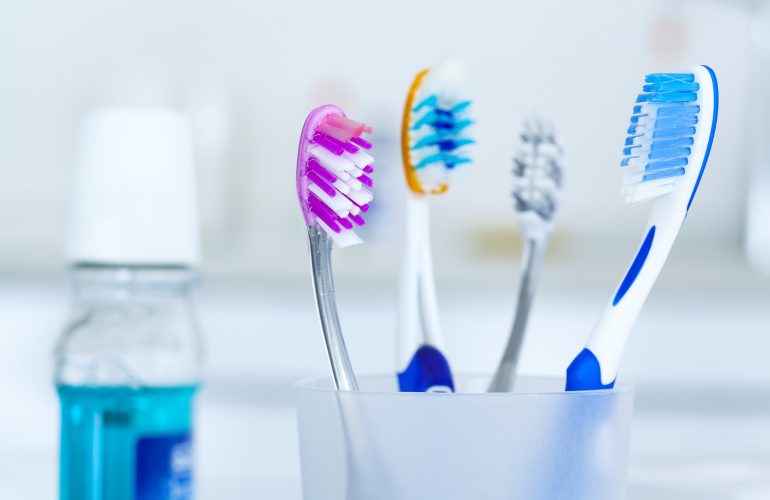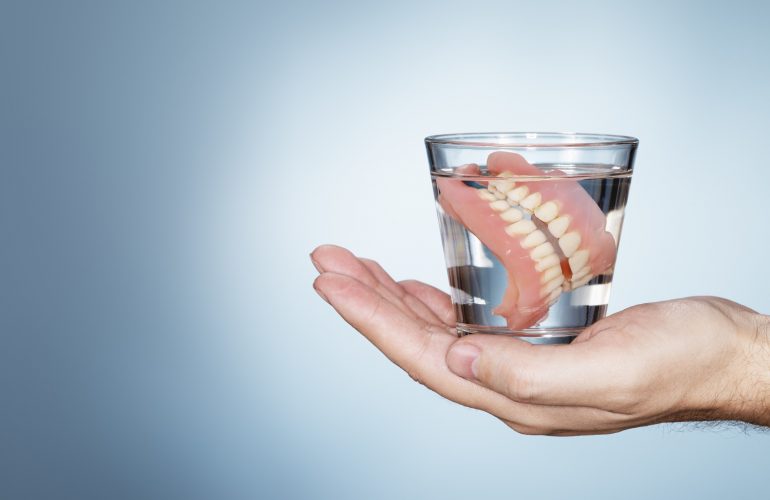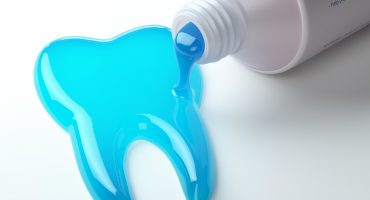There are certain dental diseases that typically occur more often in older people. These include periodontitis, root caries and inflammation of the oral mucosa. The sequelae of these diseases are not to be underestimated, especially in older patients. Therefore, it is important, especially in old age, to take enough time for a thorough and careful oral hygiene and denture care.

The Right Toothbrush and Toothpaste
Fluoridated toothpaste and a toothbrush are just as important for daily dental care as the A to O. However, elderly people with limited hand mobility often find it difficult to hold a toothbrush and make the right brushing motions. For this purpose, there are now specially shaped three-head toothbrushes, with which even people with reduced mobility can achieve a good cleaning effectiveness.
Three-head toothbrushes are always appropriate when the person is still able to move the toothbrush itself back and forth, but the fine motor skills has already subsided. The three-head toothbrush only needs to be moved from front to back and cleans all three sides of the teeth at once during this process.
People with bent hands, such as gout or osteoarthritis, often can not use ordinary toothbrushes because the brush handles are simply too slender and narrow. No special toothbrush is needed here, just a little trick. By thickening the brush handle, the toothbrush can be kept well in most cases and thereby be well guided while brushing your teeth. Reinforcing the handle well with a piece of foam rubber cover, which is offered in the trade as a simple pipe insulation is quite cheap. The foam rubber cover can be used with every toothbrush. When renewing the brush, simply pull it off and put it back on the new toothbrush.
For people who are severely limited in motor skills and for those who need oral care from a third party, the use of an electric toothbrush is particularly useful. The toothbrush moves back and forth on the teeth for cleaning, which of course makes the entire cleaning process much easier for an elderly person.
Prostate wearers should also pay special attention to their oral hygiene. The cleaning of the prosthesis alone is not enough, because gums and palate also need to be cared for. Prosthesis wearers often suffer from bad breath and irritation and inflammation of the gums, despite thorough cleaning of the teeth. Therefore, the gums and palate should be cleaned regularly with a soft toothbrush. This not only cleanses the oral mucosa of unpleasant deposits, but also promotes the circulation of the gums.
Then it should be rinsed briefly with mouthwash in order to additionally protect the gums which is heavily stressed by the prosthesis.

Dental floss and interdental brushes
If dental floss is used correctly, the use is recommended to every person. For the care of bridges and implants, commercially available flosses are available that facilitate the cleaning of hard-to-reach areas with their elastic threads.
However, since especially in old age, the motor ability of the hands often subsides and in addition the interdental spaces are widened in most people, the cleaning of the interdental spaces with interdental brushes is easier. It is precisely because of these problems that many older people tend to use simple toothpicks, as they are easier to handle than dental floss and less expensive than interdental brushes. As a general rule, you should not use a toothpick for daily dental care, unless they are special toothbrushes for dental care.
Tongue cleaner
Especially in the elderly, the tongue is often covered with a yellowish-white coating, which often causes bad breath. The reason for this, as mentioned above, lies in the fact that, although the dentures are thoroughly cleaned, the gums and oral mucosa are forgotten during cleaning. Unpleasant tongue coating should not be removed with the toothbrush, because the taste buds on the surface are very sensitive. There are tongue brushes and tongue scrapers commercially available for this type of cleaning. With these special instruments, tongue coating can be removed easily and gently.

Care of Dentures
For the long preservation of the teeth, careful care of the denture is particularly important. Every day harmful bacterial plaque deposit on its surface, which can cause bad breath as well as severe inflammation of the gums. Therefore, dentures as well as real teeth must be thoroughly cleaned daily.
For daily cleaning special denture brushes are commercially available, which in contrast to a normal toothbrush still have tufts on the opposite side. This not only facilitates the cleaning of the outer surfaces and interdental spaces of the prostheses, but also the hard to reach places where the teeth rest on the jawbone. At least once a day the denture should be cleaned with the denture brush and a special cleaning agent. Although a simple toothpaste can be used for cleaning, one should definitely make sure that it has a low abrasiveness, so as not to damage the teeth with small abrasive particles.
In addition to this basic cleaning, the prosthesis should be cleaned every evening, but at least every other day, be cleaned in a bath of cleaning concentrate. For this purpose, there are commercially available cleaning tablets or powders, which are dissolved in water. The denture is placed in this cleaning solution for several minutes (depending on the type). Be sure to follow the cleaning instructions for your tablets or powder, and do not leave the denture too long in the cleaning bath, as this may damage the plastic holder. Do not forget to thoroughly rinse the denture with water before you put it back in.
Weitere Beiträge

Care of the deciduous teeth
Even if the deciduous teeth remain in the dentition for only a few years before being replaced by the permanent teeth, the care of the deciduous teeth in children should not be neglected. Because diseased and destroyed baby teeth can lead to a disturbed function of the masticatory system as well as permanent teeth.

Dental anxiety
In Germany alone, one in five people are afraid of visiting the dentist, and not just of major surgery. Before each appointment, this uncomfortable feeling spreads, sometimes severely and with significant side effects. Where this fear comes from, what helps and what you can do about it, we have collected for you.


